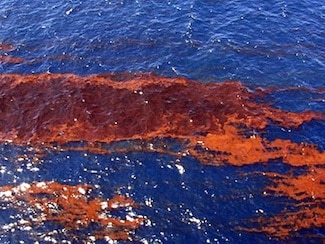A preliminary report released Wednesday by the federal Gulf Coast Ecosystem Restoration Task Force says that cleanup is needed for the Gulf of Mexico “urgently,” in order to protect the environmental and economical status of the Gulf.
The task force was established by President Obama after the oil disaster in the Gulf last summer, and is set to deliver a final report on the status of the Gulf of Mexico, as well as a restoration strategy for Gulf Coast states to implement in order to save the region. The goals set forward by the task force include conserving habitats along the Gulf Coast, improving water quality, protecting coastal resources, and enhancing the resilience of coastal communities.
After last year’s oil geyser and decades of runoff from the Mississippi river, the Gulf is facing extreme conditions that are making it more and more difficult to sustain the life of the Gulf Coast region. As The Associated Press points out:
The Gulf of Mexico’s ecosystem, long the victim of upstream efforts to allow easy ship navigation and prevent Mississippi River flooding, has been in a state of environmental decline for decades.
BP‘s oil spill, the largest offshore spill in U.S. history, drew public attention to the slow, persistent damage done to the area that produced 30 percent of the nation’s gross domestic product in 2009. The sudden fear that the oil would permanently harm the marine and coastal area created an urgency to fix those woes.
Even before BP’s oil gusher, the Gulf of Mexico was already home to one of the largest dead zones in the world – an area so devoid of oxygen that it choked out all living organisms. The area, stretching between 6,000 and 7,000 square miles, was created by decades of runoff from the Mississippi River that carried nitrogen and phosphorous into the Gulf. These nutrients are the result of runoff, sewage, and animal wastes, and reports show that the amount of nutrient runoff has more than tripled in the last 50 years due to human activity. And due to the presence of oil, as well as massive runoffs from severe winter storms this year, experts predict that the Gulf of Mexico dead zone will begin to grow at unprecedented rates, possibly even reaching as large as 9,400 square miles, if no action is taken.
But the environmental impacts are only part of the story. The Gulf of Mexico is also a very economically important body of water. In 2009, the Gulf of Mexico accounted for almost 30% of total gross domestic product in the United States. Of that 30%, half came from the oil industry, while the other half was from fishing, tourism, and shipping. Together, they create a $230 billion a year economy that affects the rest of the country. Sadly, in the wake of the oil leak, the only economy that has fully rebounded in the Gulf region is the oil industry – the very same industry that has exacerbated the problems along the Gulf Coast. And as long as the Gulf remains littered with oil rigs, the potential for a spill will always be there.
But in spite of the troubles facing the Gulf of Mexico, there is a very good chance that the Gulf Coast region can recover. If new standards are put in place regarding the use of fertilizers and handling of sewage and animal waste, the size of the dead zone could significantly decrease. If the Task Force’s recommendations, once fully released, are enacted, the Gulf of Mexico may once again be a robust environmental haven and economic powerhouse in America.
Subscribe to our newsletter
Stay up to date with DeSmog news and alerts






